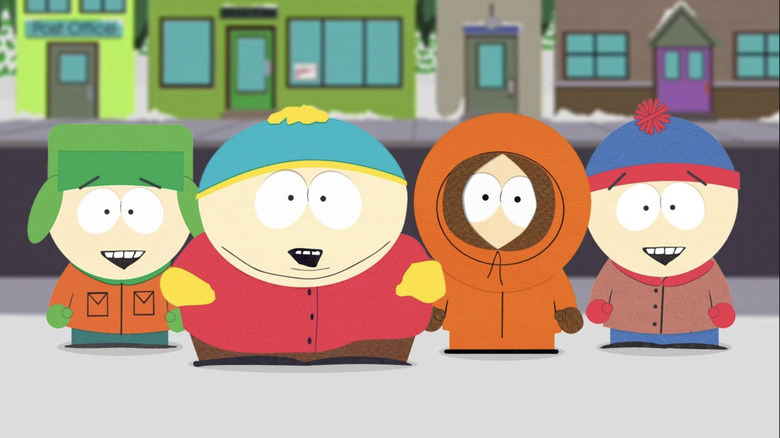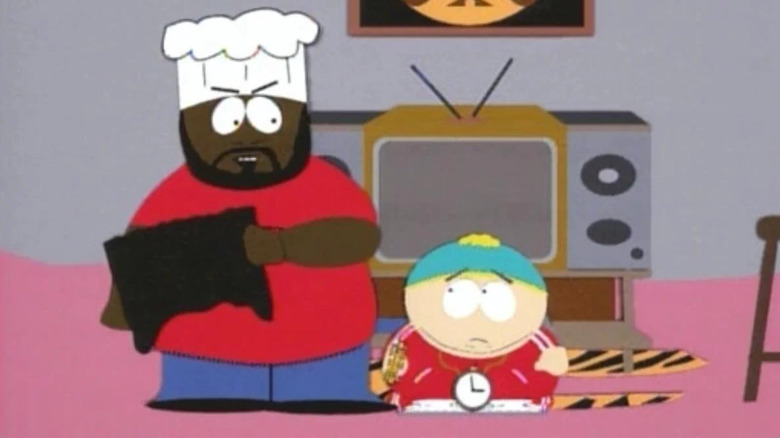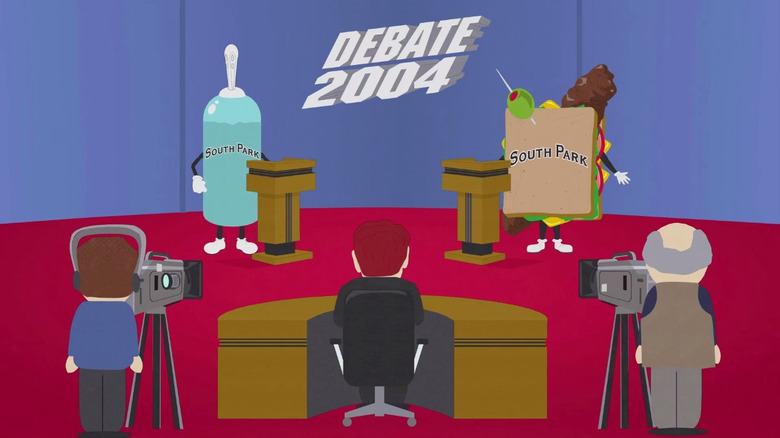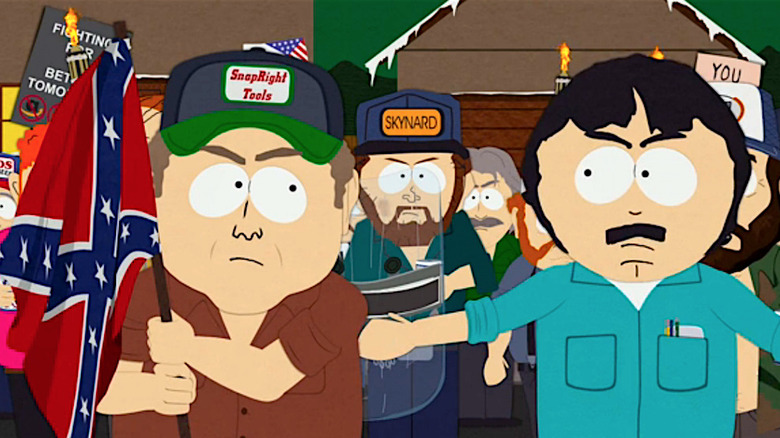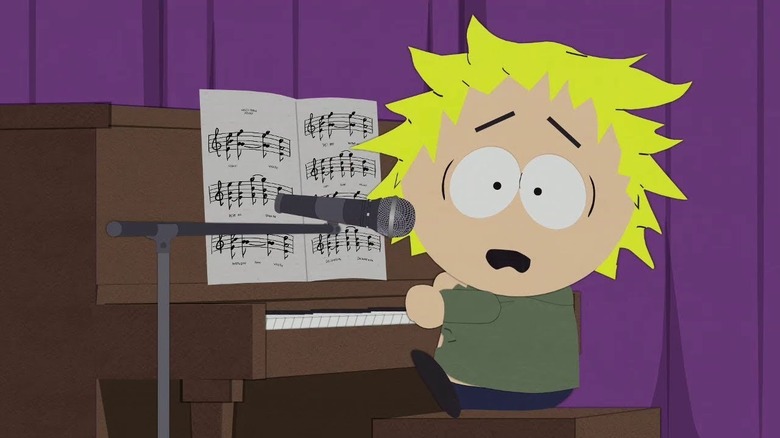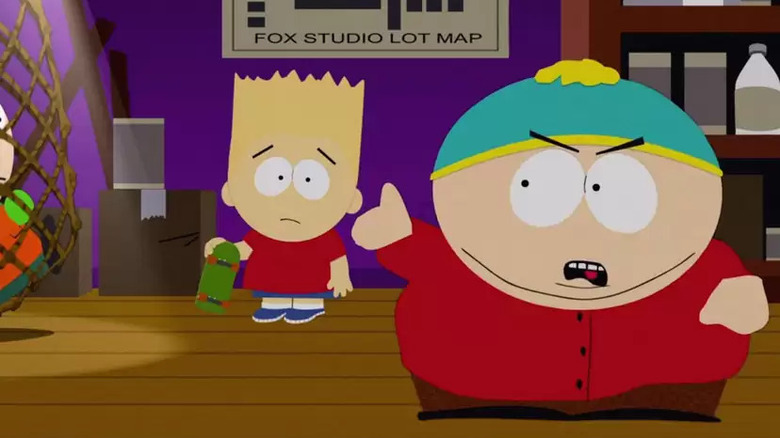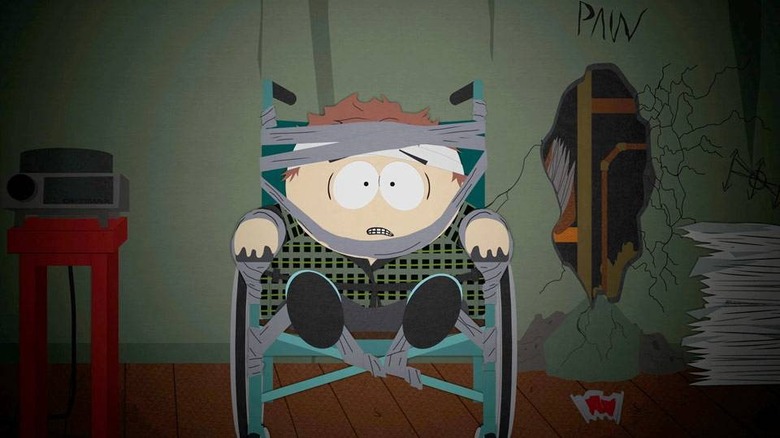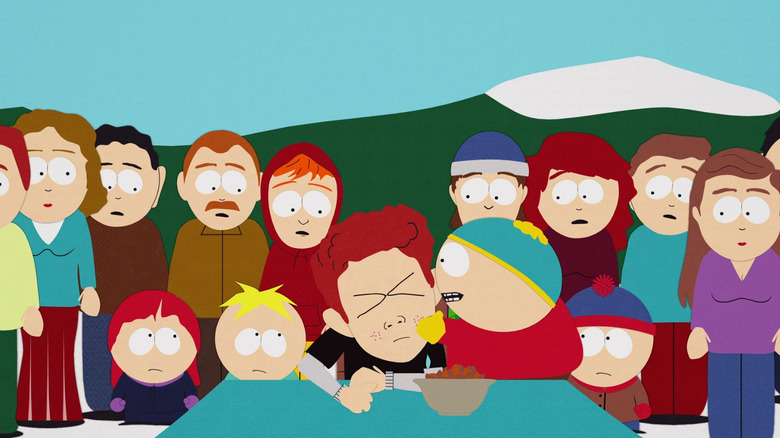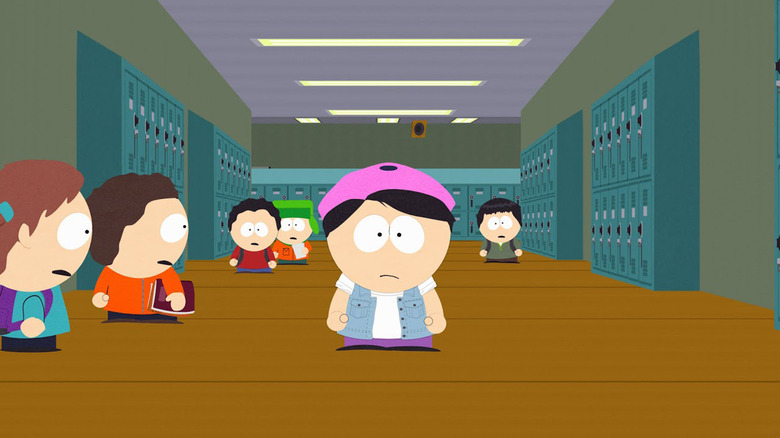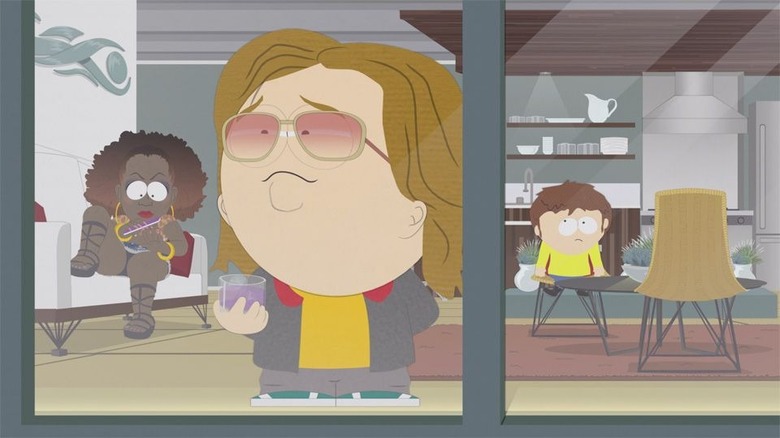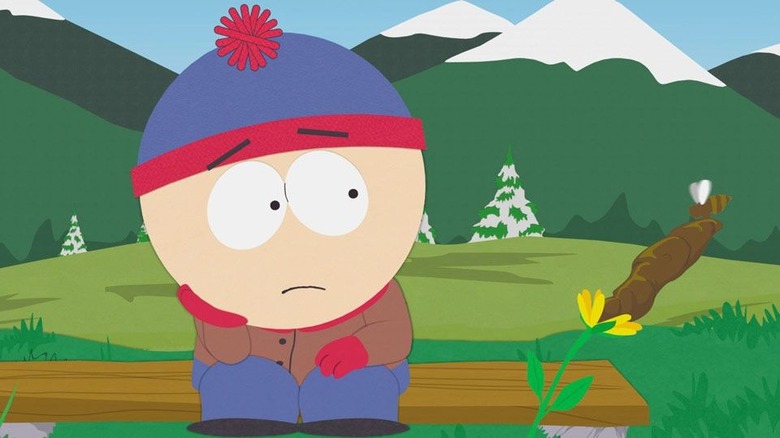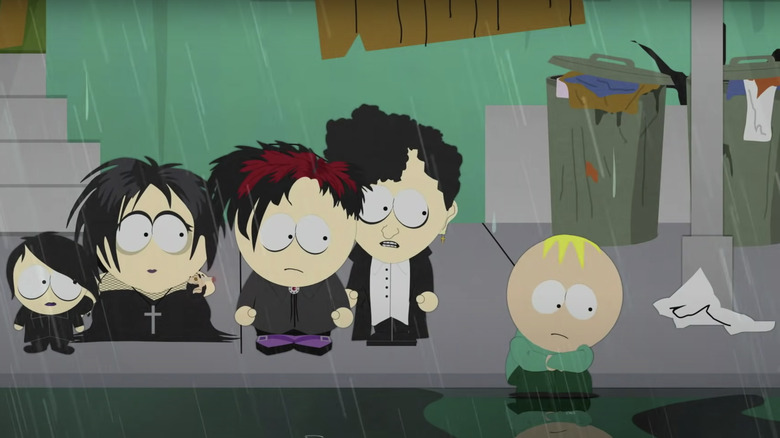Why South Park Has Been A Cultural Rorschach Test For 25 Years
Somewhere in my parents' attic, there's a dusty VHS tape featuring a New Year's Eve marathon of "South Park" recorded off the TV, with bursts of footage of "KaBLaM!!" from when I flipped to Nickelodeon so my grandma wouldn't know what I was watching. When my elementary school sent out a warning to parents about an "animated show not safe for children," my parents immediately took a "don't tell me how to raise my kid" stance, and we watched it together. The way they saw it, refusing access would only make me want it more, and at least this way, they'd be there to answer any questions I had and have an idea of what words I'd been learning. I have few conscious memories of a life before "South Park" and unlike most of the kids I grew up with, I was never denied whatever vulgar nonsense Stan, Kyle, Kenny, and Cartman were getting into.
This puts me in a very peculiar position to assess the legacy of "South Park" because I truly was born in it and molded by it. In preparation for the show's 25th anniversary, I did a full franchise rewatch. I'm talking, every episode, the feature film, the streaming specials, the documentary, the video games, and I even watched show creators Trey Parker and Matt Stone's non-"South Park" films, and listened to "The Book of Mormon." (I have seen the stage show multiple times). Given how influential "South Park" was in my formative years, it felt vital to go back and rewatch everything from an educated, nuanced, and most importantly, adult perspective. I braced myself to feel embarrassed or *gasp* offended.
Instead, I came out the other side viewing "South Park" as culture's greatest Rorschach test.
25 years of cultural shifts
No other show on television has ever been as decidedly polarizing as "South Park." Since the show's debut in 1997, the filthy satire starring elementary schoolers set in the quiet, mountain town of South Park, Colorado has been partitioning audiences for two and half decades. As a kid, "good" parents were the ones who banned "South Park" from their homes and "bad" parents were the ones like mine, who taught their kids what an "anal probe" was. 25 years later, these antithetical viewpoints have ballooned to "best comedy in TV history" to "this show is responsible for the alt-right." The show cut its teeth with an unflinching approach to cultural commentary, making fun of anyone and anything in a time when America was still trying to escape the clutches of the moral majority and their tireless attempts to squash progress.
Now, in a post-Trump era, those same conservatives are the ones who have weaponized the right to free speech as a way to persecute and invoke legitimate harm to marginalized communities. The late '90s and early '00s were all about preaching equality, allowing "South Park" to fire off their barbs with reckless abandon because everyone was treated equally as fair play. Decades later, the "nothing is off limits" approach of "South Park" isn't as easy to navigate. The cultural conversation around comedy has evolved with the understanding we should be focusing on equity, rather than equality, and punching down is lazy. Of course, plenty of comedians refuse to get on board, but despite popular belief, "South Park" isn't one of them.
The show plays both sides ... or does it?
I fell off watching "South Park" consistently when I started high school, feeling some kind of way about how casually the show described most things as "gay" while trying to unpack my own identity. The straw that broke the camel's back was the election episode "Douche and Turd." The story pits two mascot opponents against one another, and I walked away furious that anyone could dare believe the right and left were "equally bad." I felt betrayed. How could "South Park" believe the left was on the same level as the right, especially when they had always been on the side of progress with social issues?
Then I rewatched the episode as an adult.
"Douche and Turd" isn't an episode positioning both sides as being equally bad, it's an episode about how the American two-party system is broken. Stan spends the entire episode not wanting to vote because he doesn't like either candidate, but ultimately in the end decides to cast a ballot, knowing that he's going to be stuck with whoever wins regardless. It took me living through the 2020 election to finally "get it." As a lesbian married to a trans woman, there was no way in hell I was voting for the giant douche, instead giving my vote to the turd sandwich. I didn't want either candidate, but at least the one I chose presents their capitalist conservatism with a performative hashtag and rainbow font. But even making a declarative statement of what the episode is really about is futile, because the legacy of "South Park" is not in its literal content, but how it is interpreted.
Where do Parker and Stone actually stand?
The ideology of "South Park" has been hotly debated for decades. Conservatives believe their takedowns of political correctness place the show on their side, while liberals have pointed to the show's history of groundbreaking progressiveness as a sign that the show is firmly left leaning. Parker and Stone's own political ideologies have also been heavily debated, with Stone's infamous response on an online fan forum of "I hate conservatives, but I really f****** hate liberals," oft cited as proof that the two are libertarians. The duo have said many times that the libertarian label is not entirely appropriate, and given their reputation for saying and doing things solely to rile people up, declaring that any of us "knows" where they stand is a fool's errand.
We can speculate, for sure, but for all we know, Parker and Stone are anarchists laughing their butts off as we try to categorize them. Their refusal to "pick a side" has been frustrating for a lot of viewers, who consistently accuse them of trying to "play both sides." In a 2004 interview, New York Times writer Sharon Waxman called the lack of taking a stance childish and asked "doesn't anything matter?" To which Parker retorted, "That's not our job, our job is making fun of stuff." After this full franchise rewatch, I've realized that the intentions behind Parker and Stone's commentary doesn't actually matter. People watching the show are going to see and take from it what they want, regardless of what the duo says or how it's presented. Their job is to make fun of stuff. Our job is to figure out what it means to us, personally.
Set atop an impossible pedestal
Given the six-day turnaround of every episode, the show has been able to provide timely commentary on current events, but this extremely fast turnaround time doesn't allow for their satirical comments to be as meaningful as they are entertaining. This is likely why their made-for-streaming movies on Paramount+ have been so well received, because the story wasn't limited by the rapid turnaround. Despite that, "South Park" has been continually treated by critics and culture writers alike as a measuring stick for the current state of the culture wars. The New York Times published "How 'South Park' Perfectly Captures Our Era of Outrage" and The AV Club followed with "'South Park' Raised a Generation of Trolls." The show is unwillingly treated as the ultimate arbiter of American political commentary in entertainment, establishing an impossible standard for all involved and only setting up viewers for frustration and disappointment when the show fails to meet the standards it never asked for.
Outside of late night talk shows or political commentary shows like "The Daily Show" and "Last Week Tonight," "South Park" is unique in its ability to produce a show with immediate commentary. This isn't to say Parker and Stone deserve a pass for all of the times their commentary missed the mark or contributed to genuinely harmful discourse, but believing a highly controversial show is going to nail it 100% of the time with 300-plus episodes and a dramatically shifting social climate is an unreasonable and unfair barometer to maintain. It's also a caliber its contemporaries have never been pressured to sustain. To quote Tweek, "That's way too much pressure, you guys."
SIMPSONS DID IT!
Even though similar shows like "The Simpsons" or "Family Guy" have been on the air for many, many years, neither show has been defined by their worst moments the way "South Park" often is. The cultural conversations about all three shows are entirely different. When someone says "Oh, I love 'The Simpsons," our brains immediately imagine the golden years of the series, when seemingly everyone on Earth was a fan.
There's an unspoken cultural agreement that we're all talking about "those years" of the show and not whatever it is they're currently airing on Fox. Whereas when someone says "Oh, I love South Park," the reaction sparks an assumption of the person's character, because the unspoken cultural agreement surrounding the show is "'South Park' is problematic ... SO THIS PERSON CLEARLY CONDONES THAT!" Not only does this mentality relegate the legacy of "South Park" to its most offensive missteps, but it allows fans to ignore or disassociate shows like "The Simpsons" from their own less-than-spotless histories.
I don't have the answer as to why this phenomenon exists nor will I pretend to know the exact answer, but I do have a theory. Given the controversial history of "South Park," and how public perception of the show has shifted wildly as culture has progressed, it's become the standard and not the exception to assume that all of the satire presented on "South Park" was crafted in bad faith. It's as if people believe Matt and Trey are sitting around in a writer's thinktank deciding "who should we make fun of this week?," despite what "6 Days to Air" and former writers have attested. That's not how things actually run at South Park Studios.
The Rorschach Test
I came across a quote from Matt Stone from an interview with the Seattle Post-Intelligencer, where he said, "Believe it or not, we consider 'South Park' to be art, and art should be a Rorschach Test. It should be an examination of our own emotions." I can't stop thinking about how accurate of a description a Rorschach Test is to describe "South Park," given the way public reactions to controversial episodes are often in direct conflict with one another. Arguably the best example to prove this point is the season 11 opener from 2007, "With Apologies to Jesse Jackson." The episode focuses on Randy Marsh, who while competing on "Wheel of Fortune," is given the category "People Who Annoy You" and the letters "N, G, G, E, R, S." The inevitable answer is, of course, "Naggers," but that is not what Randy confidentially screams on live television.
The episode has been vehemently debated, with many viewing the episode as blatantly racist, while at the same time, the episode has been praised by civil rights groups and been the topic of academic analysis regarding white fragility/anxiety. Kovon and Jill Flowers, who co-founded the organization Abolish the "N" Word, were cited on an episode of Paula Zahn Now in defense of the episode's usage, and praising the way the satire could be used as an educational moment. But marginalized people are not a monolith, so one organization's praise of the episode should not and does not negate the criticisms of other people, which continues to prove the Rorschach Test comparison — we see what we see, regardless of Matt and Trey's intent.
Cartman has never been a hero
This Rorschach Test is both a blessing and a curse, as I firmly believe the biggest problem "South Park" has is not in the content it presents, but in the way the content has been received. Since the show's pilot episode, Eric Cartman has consistently been presented as a villain. He's crass, he's a fascist, and for some reason an ungodly number people thought depiction meant endorsement and turned him into an idol. I genuinely believe that Parker and Stone crafted "South Park" with the belief that the people who would gravitate toward the show were as intelligent as they were, and thereby would be able to pick up on the satire of the show.
Unfortunately, as we've come to learn, people are idiots. That might sound harsh, but take a second and think about that guy you knew in 2003 who constantly quoted Cartman in response to real life situations. He's the same dude who currently thinks there are microchips in the COVID-19 vaccine, isn't he? So many people got hung up on "RESPECT MY AUTHORITAH" being one of the most quotable lines from the late '90s that they forgot this is a character who murders a couple (one of which is his biological father) and tricks their son into cannibalising his own parents in a bowl of chili. Cartman has never been portrayed on "South Park" as anything other than a monster, but that didn't stop from a bunch of people from confusing "protagonist" with "hero" and parroting his bigoted remarks.
Sometimes the audience IS smarter
At the same time, there are plenty of people watching and consuming "South Park" who, quite often, know more what they're talking about regarding specific topics than Matt and Trey. The commentary the show makes is reactionary by the nature of the production schedule, and to believe two disgustingly wealthy, cisgender heterosexual white dudes in their 50s have a fully nuanced and appropriate reaction to whatever current event is currently plaguing our water cooler conversations is absurd. They're not always right, and it's a good thing to call them out on it. The entire 2005 run of "Mrs. Garrison," (in which Mr. Garrison briefly underwent gender affirming surgery to live as a trans woman) was a whopping miss, but the 2014 episode "The Cissy," showed that they clearly learned from their past mistakes regarding transgender representation.
This rough track record has led to a sense of distrust for a lot of people, which is completely understandable. When you genuinely know more about a topic that people with a financial empire are parodying in the name of entertainment, it feels unnecessary to tune in. There are also those who are living every single day in a world where their existence has been turned into political bargaining chips (myself included) and sometimes the last thing you need is to hear what someone outside of your identity "has to say" about your identity. I don't bemoan anyone for not watching "South Park," but I also don't subscribe to the idea that I'm somehow a "bad gay" for believing the show still has merit after all these years.
The power in a lack of politeness
There's an old adage tossed around comedy circles that says "dare to suck," which is the idea that it's better to throw a wild swing and miss spectacularly because even if you don't nail it, you'll at least be entertaining. "South Park" often falls underneath this umbrella for me, because even when they attempt a dive and wind-up belly flopping, it is a lot more valuable to watch them fail than it is to watch a gutless tip-toe into tricky territory. After the introduction of PC Principal in 2015, this truth has become all the more evident. "South Park" has gotten really good at expressing why it's a problem that we've become so fixated on the presentation of an argument, rather than the actual content. The entire character of PC Principal is a play on those that are more interested in policing language than enacting actual systemic change. Later in the season, Jimmy's nemesis Nathan has a throwaway line that has been haunting me for weeks:
"What is PC but a verbal form of gentrification? Spruce everything up, get rid of all the ugliness in order to create a false sense of paradise."
The quote was used in reference to the way corporations and brands have developed socially conscious identities as a means to manipulate capitalism for their benefit, but the expression feels like an awfully poignant way to analyze "South Park" as a whole. Is the problem the message they're sending, or is the problem how they're sending it? Rorschach Test. Do you see?
It's gotten harder to laugh in this world
As is the case with any anniversary, Parker & Stone have been doing a lot of their own assessment of the show's legacy. "It does feel like we used to be punk rockers flipping off the principal, and now we're old men telling people, "Get off my lawn!" Stone told the LA Times. "For us, it's material. The world changes. It's interesting." The show has never strayed away from meta-commentary, with the season 15 episode "You're Getting Old" continuing to be (in my opinion) the most thought provoking and timeless entry in the show's history. It was the moment they let audiences in on a little behind-the-scenes feelings about growing older, becoming out of touch with the current coolness, and how cynicism poisons our perspectives.
The episode deeply resonated with me in a way I wasn't prepared to have to unpack, as nearly three years of living in a pandemic and a fresh new hell awaiting beneath every Twitter trending moment has made it really hard to laugh at anything these days. "They think that if you find humor in something, that means you don't care about it," Parker said in the same LA Times interview. "But the truth is, I've spent more time in a room analyzing and processing things through comedy with Matt than I do going out and talking through something with a therapist."
I talked with my therapist about "You're Getting Old" the day after I watched it.
My own Rorschach Test
The cruel irony in writing this retrospective is that this article alone serves as its own Rorschach Test. There will be those who read this and believe I'm being too kind to the show and its creators while others will find my criticisms "too woke," regardless of how I actually feel. And what I actually feel... is complicated. I can't go back in time and make "South Park" impactless on my existence, I can't make the episodes that aged like unrefrigerated hot dogs left in a hot car suddenly share the sentiments of a 2022 perspective, and honestly, I'm glad that I can't. Rewatching "South Park" was a sometimes gut-bustingly funny, sometimes incredibly painful trip back in time, but I'd be lying if I said I didn't take away far more good from my rewatch than I did bad. If I'm being honest, Butters perfectly describes how I feel about it all after he finds out the Raisins girl he thought he was dating was only being nice to him for tips:
"Well yeah, I'm sad, but at the same time I'm really happy that something could make me feel that sad. It's like, it makes me feel alive, you know? It makes me feel human. And the only way I could feel this sad now is if I felt somethin' really good before."
In our increasingly sterilized world, I'm weirdly grateful for "South Park" and its unapologetic approach to comedy. It doesn't always hit the mark, but at least the show is coming from an honest (yes, problematic feelings can be honest) place. "South Park" might as well be the Library of Alexandria of cultural commentary, even if half of the books are just pages of poop jokes. No matter how badly some people want to burn it to the ground, it would be a detriment to society to erase the undeniable impact it has had on pop culture.
